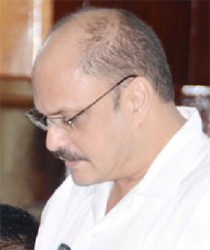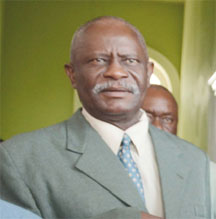The intestinal injuries sustained by prisoner Colwyn Harding, who has accused a policeman of sodomising him with a baton, resulted after an operation for an incarcerated inguinal hernia, Minister of Health Dr Bheri Ramsaran told the National Assembly yesterday.
Harding, who remains hospitalised, underwent a surgery which saw the removal of several lengths of his bowels that were found to be gangrenous but the re-joining of his intestines later caused complications and septic conditions to his abdomen, resulting in a second surgery, Ramsaran re-vealed to the House, after oral questions put to him by APNU parliamentarian on Harding, whose allegations have caused a public outcry. A policeman has since been placed under close arrest and others transferred to facilitate an internal probe into the allegations.

“The juxtapositioning of the claim or the complaint of the sexual assault need[s] to be taken in this context,” the minister said, while adding that a full report would be completed by the Georgetown Public Hospital Corporation (GPHC), where Harding is urrently hospitalised.
Ramsaran also said that a third surgery will be done in an attempt to re-join Harding’s intestines once again.
As the minister spoke, members of the opposition shouted: “Lies!” “Shame, shame!” and, “You coming here to cover up.”
“Now any doubting of this will put under questioning the professional report of professionals. So I am saying Mr Speaker and I repeat the juxtapositioning of the accusation needs to be analysed so I am quite open on this,” the minister said.
He added that while emotions are running high on the issue, he is basing his report on his trust of the professionalism of the team at the hospital.
An incarcerated inguinal hernia is a hernia that becomes stuck in the groin or scrotum and cannot be massaged back into the abdomen, according to information provided on the website of the National Digestive Diseases Infor-mation Clearinghouse, which is a service of the National Institute of Diabetes and Digestive and Kidney Diseases, National Institutes of Health in the United States.
It said an incarcerated hernia “is caused by swelling and can lead to a strangulated hernia, in which the blood supply to the incarcerated small intestine is jeopardized. A strangulated hernia is a serious condition and requires immediate medical attention.”
It further noted that if left untreated, nausea, vomiting, and severe infection can occur. “If surgery is not performed right away, the condition can become life threatening, and the affected intestine may die. Then that portion of the intestine must be removed,” it said.
When contacted, Colwyn Harding’s mother, Sharon Harding said she is unaware that her son was suffering from a hernia and in her own words described him prior to his arrest as being “strong and healthy.”

“Oh boy, they really finding a way out,” Harding said, while reiterating that when her son first called from the Timehri Police Station, where he had been detained after his arrest, he was crying and asking her to bring the media because he was being sexually assaulted by a police. She said that the man’s girlfriend saw when a condom was placed on a baton before she was physically assaulted and removed from the room after she objected.
Felix, a former commissioner of police, said he was bringing the matter, which is “gross, perverse, cruel and inhumane” to the House’s attention and that it should attract the condemnation of every member.
He asked the minister to state the extent of the injuries suffered by Harding, the cost of hospitalisation and what assistance and immediate relief he was willing to provide to the young man.
Minister Ramsaran subsequently explained that Harding had surgery for an incarcerated inguinal hernia and he stated that it is a known fact if the hernia is incarcerated long enough, it would cause injury to the length of the bowel. The surgery was performed and lengths of bowels were found gangrenous and strangulated in the right scrotal sack and had to be removed, he said.
“In other words, you had two lengths of bowels which had to be joined and the surgeon did that… and that occurred I think in an emergency fashion on the 18th of December,” the minister revealed.
Harding, he said, was under “proper nursing care” in the High Dependency Unit (HDU) of the hospital but there was a “breakdown of the joining of the two intestines [and] this led to certain serious internal complications, including septic conditions within the abdomen.”
“This meant that the patient had to be re-opened coming out of the first operation for the strangulated inguinal hernia,” he noted.
“In other words the young man is minus a significant length of his intestine,” the minister added, saying that attempts to rejoin the intestine to reestablish patency of the digestive track failed after a few days and on December 28th he had another surgery.
Because of the complications after the first surgery, the young man had to use colostomy bags to defecate after the second surgery.
“The colostomy, Mr Speaker, is a direct result of the doctors’ attempts to repair that damage,” the minister said.
He said Harding’s condition has improved enough for the doctors to make another attempt to re-link the two ends of the intestines and this will hopefully lead to his “ultimate healing and patency of the digestive track, allowing the anus to be used for what it was originally intended.”
In answer to what assistance would be given to Harding, the minister said the hospital and the public system does not offer assistance to patients independently but simply provides the services to the best of their ability. He added that cost cannot be accumulated but he said they are giving the patient maximum treatment.
The minister’s answers may not have only agitated those on the opposition seats based on Ramsaran’s response to an inaudible remark made by his colleague Odinga Lumumba. “Comrade, I am the Minister of Health and I will make my determination how I answer, okay Lumumba,” he said to his fellow PPP/C MP.
Further questioning the minister, Felix asked whether the hospital has colostomy bags, whether it will support Harding after he is discharged, and about the possibility of the man being sent overseas for treatment. He also asked about an independent examination of Harding.
To this, the minister said bags are given to patients and usually when they are discharged in such a condition they are given a small stock of bags until they return to clinic. He said he does not see any deviation from this practice in Harding’s case. “I will be keeping a special attention, Mr Felix, to see that his supply is adequate,” the minister added.
As it relates to overseas treatment, the minister said Harding’s case is well within the skills of local medical professionals. He added that the ministry is quite open to Harding being examined independently as patients are entitled to second opinions.




